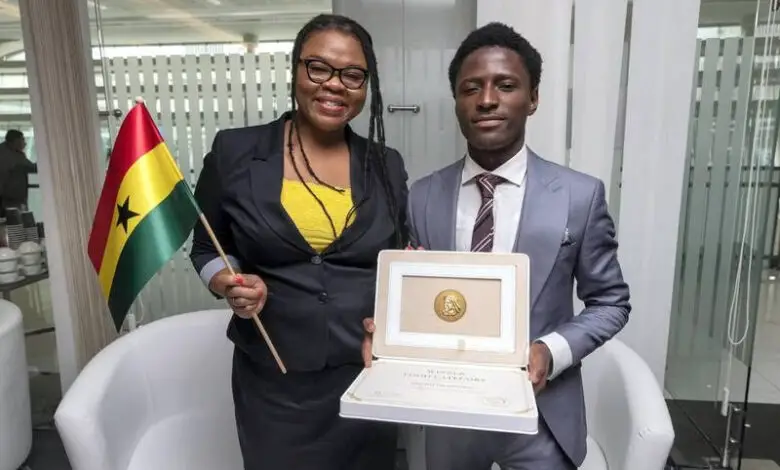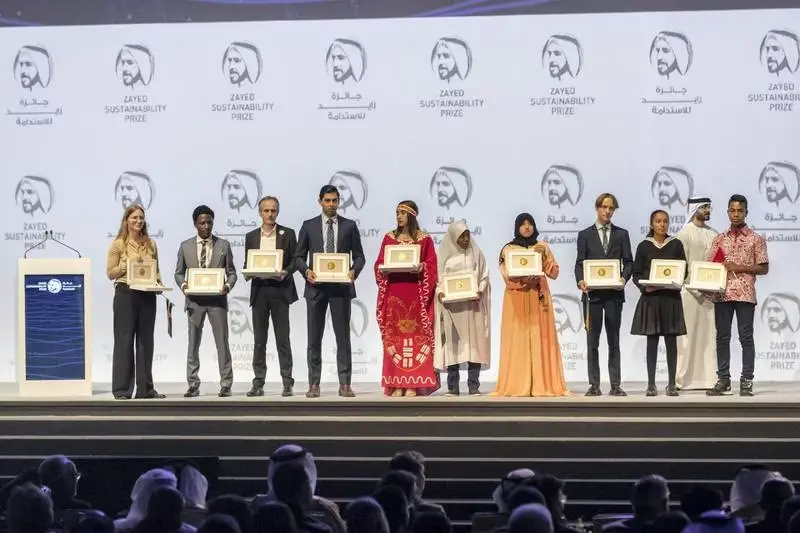Ghanaian Teenager Wins Dh2.2 Million ($600,000)

A young person from Ghana started learning how to code on his own only three years ago. Recently, he won the Zayed Sustainability Prize. Mustapha Haqq, who is 18 years old, received Dh2.2 million ($600,000) to create a smartphone app that helps farmers identify and treat plant diseases.
Mustapha co-founded the Okuafo Foundation, and they were one of the ten winners of the 2020 prize. In total, the winners will receive Dh11 million ($3 million) in funding. When Mustapha’s project was announced as a winner at the Abu Dhabi Sustainability Week, he couldn’t hide his joy. He covered his face with his hands in excitement.
“My family didn’t have a computer,” Mustapha shared with The National. “But I realized that technology could solve important problems like drought and hunger.”
Mark Zuckerberg started Facebook while he was in his dorm room, and now it connects over two billion people.
“I thought, ‘I can do that.’ Maybe I can connect four billion people.”
Mustapha, who grew up in a poor area in Ghana, always found inspiration in successful tech entrepreneurs like Zuckerberg.
He would spend his days at computer cafes in his town, where he noticed many teenagers using the internet for scams and fraud.
“I taught myself to code by watching YouTube videos,” he explained.
In 2018, this ambitious young entrepreneur created a mobile app to improve the lives of local farmers.
He discovered that many farmers were experiencing significant crop losses due to harmful pests like the fall armyworm, which is originally from North and South America but was first reported in Africa in 2016.

Mustapha’s app utilizes artificial intelligence and data analytics to address the widespread damage to agricultural produce.
“It essentially predicts and identifies crop diseases and infestations, providing real-time scientific solutions,” he explained.
“Farmers can take prompt action and minimize the impact on their crops through smart technology.”
With the prize money of Dh2.2 million, Mustapha plans to expand the reach of his project to more farmers.
“We collaborate with farmer leaders who help us promote our work,” he stated.
“Using the funds, we can travel to remote communities, engage with more farmers, and provide support and guidance on crop safety.”
Since its establishment in 2008 by Sheikh Mohamed bin Zayed, Crown Prince of Abu Dhabi and Deputy Supreme Commander of the Armed Forces, the Zayed Sustainability Prize in the UAE has been a catalyst for leveraging new technologies to bring about positive changes in people’s lives.
It has grown to become one of the most prestigious global awards for driving impactful transformations.
On Monday, the Zayed Sustainability Prize announced 10 winners across five categories: health, food, energy, water, and education.
Sheikh Mohamed expressed his admiration for the winners on Twitter, stating, “Today, we honor the winners of the Zayed Sustainability Prize, pioneers in sustainable development and humanitarian work.”
During the event, Sheikh Mohamed shared a touching moment with 15-year-old Buretaake Ioane from the Republic of Kiribati, located in the central Pacific Ocean. Ioane’s school, Eutan Tarawa Ieta Junior Secondary School, secured first place in its region in the Global High Schools category.
“I was shocked and excited. I couldn’t believe it. That’s why I hugged his highness so tightly,” Ioane shared with The National. “It was my way of expressing true gratitude for what this means for my small school back home.”
With the prize money, Ioane’s teachers plan to convert a portion of the school grounds into a food production area, establishing a vegetable garden and a sizable chicken barn.
In the energy category, Electricians Without Borders, a French non-profit organization with over 30 years of experience in more than 50 countries, emerged as winners. Their work involves providing solar equipment to refugee camps and rural communities.
Here are the winners in each category:
Table of Contents
Health: Globhe
They use drone data to assist in preventing and responding to disease outbreaks and natural disasters.
Food: Okuafo Foundation
Their smartphone app helps farmers identify and address plant diseases and pests.
Energy: Electricians Without Borders
They provide high-quality solar equipment and training to rural communities and refugee camps.
Water: Ceres Imaging
They offer farmers aerial images to enhance crop growth efficiency.
Education:
- Global High Schools (Americas): Air Batalla from Columbia
- Global High Schools (Sub-Saharan Africa): Hakimi Aliyu Day Secondary School from Nigeria
- Global High Schools (Middle East and North Africa): Al Amal Junior High School from Morocco
- Global High Schools (Europe and Central Asia): United World College Mostar from Bosnia and Herzegovina
- Global High Schools (South Asia): Bloom Nepal School from Nepal
- Global High Schools (East Asia and Pacific): Eutan Tarawa Ieta Junior Secondary School from the Republic of Kiribati
